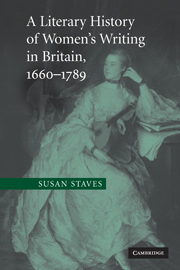Book contents
- Frontmatter
- Contents
- Acknowledgments
- Introduction
- 1 Public women: the Restoration to the death of Aphra Behn, 1660–1689
- 2 Partisans of virtue and religion, 1689–1702
- 3 Politics, gallantry, and ladies in the reign of Queen Anne, 1702–1714
- 4 Battle joined, 1715–1737
- 5 Women as members of the literary family, 1737–1756
- 6 Bluestockings and sentimental writers, 1756–1776
- 7 Romance and comedy, 1777–1789
- Notes
- Recommended modern editions
- Select bibliography
- Index
3 - Politics, gallantry, and ladies in the reign of Queen Anne, 1702–1714
Published online by Cambridge University Press: 06 November 2009
- Frontmatter
- Contents
- Acknowledgments
- Introduction
- 1 Public women: the Restoration to the death of Aphra Behn, 1660–1689
- 2 Partisans of virtue and religion, 1689–1702
- 3 Politics, gallantry, and ladies in the reign of Queen Anne, 1702–1714
- 4 Battle joined, 1715–1737
- 5 Women as members of the literary family, 1737–1756
- 6 Bluestockings and sentimental writers, 1756–1776
- 7 Romance and comedy, 1777–1789
- Notes
- Recommended modern editions
- Select bibliography
- Index
Summary
TEXTS
1703 Mrs. S. F. [Sarah Fyge Egerton]. Poems on Several Occasions. Together with a Pastoral
1703 Lady Mary Chudleigh. Poems on Several Occasions. Together with the Song of the Three Children Paraphras'd
1704 [Mary Astell]. A Fair Way With the Dissenters and Their Patrons. Not Writ by Mr. L——-y, or any other Furious Jacobite, whether Clergyman or Layman; but by a very Moderate Person and Dutiful Subject to the Queen
1706 Catharine Trotter. The Revolution of Sweden (Haymarket)
1709 Susanna Centlivre. The Busie Body (Drury Lane)
1709 [Delarivière Manley]. Secret Memoirs and Manners of Several Persons of Quality, of both Sexes. From the New Atalantis, an Island in the Mediteranean [!]. Written originally in Italian. 2 volumes
1713 [Anne Finch, Countess of Winchilsea]. Miscellany Poems, on Several Occasions. Written by a Lady
1714 Susanna Centlivre. The Wonder: A Woman Keeps a Secret (Drury Lane)
1714 [Delarivière Manley]. The Adventures of Rivella: or, the History of the Author of the Atalantis with Secret Memoirs and Characters of Several Considerable Persons Her Contemporaries
INTRODUCTION
The accession of Queen Anne, Protestant daughter of James II, according to the plan Parliament had devised at the Glorious Revolution, meant that the Revolution settlement of the nation's affairs was increasingly secure. The political parties that had begun to emerge out of the Restoration Exclusion Crisis now began to take the shape of modern political parties. The Tory party had a majority of popular support in the country, as well as the enthusiasm of the Queen.
- Type
- Chapter
- Information
- A Literary History of Women's Writing in Britain, 1660–1789 , pp. 122 - 165Publisher: Cambridge University PressPrint publication year: 2006



